
by Aislinn Rose
*Updated Tuesday, October 9th: Kristina Nicoll has been added to the indie slate, rounding off the number of candidates to 7, the same number of seats available in the Ontario region.*
Last Monday, CAEA Ontario held an all-candidates night to introduce the 20 local candidates running to fill 7 Ontario seats. Each candidate was given an opportunity to read their prepared statement and then take questions from the audience.
From those statements, 6 candidates have emerged as a clear slate of member/creators with three main priorities should they be elected:
- A new Indie Agreement that reflects the will of the membership
- Drastically improved communication between staff, council and the membership
- A Re-examination of the role Equity plays within the performing arts ecology
We would like to introduce you to the slate of candidates whose collective platform we are endorsing:
Hume Baugh
Mark Brownell
Brenley Charkow
Kate Fenton
Kristina Nicoll – added October 9th
Vinetta Strombergs
Aaron Willis
You can read their entire collective statement at the bottom of this post.
As Co-Chair of the TAPA Indie Caucus, and Artistic Producer of Praxis Theatre, I’m sure it will come as no surprise to our regular readers that I am weighing on this election, and endorsing an indie slate with these collective intentions. We have written extensively about Equity’s long and drawn-out process to create a new Indie Agreement, and my Praxis colleague Michael Wheeler has endorsed Equity Councillor and CPAG candidates in previous years.
As with all elections, it’s important to make an informed decision. Over the next couple of weeks, I’ll be writing more about the Indie Agreement and what I think it means to “reflect the will of the membership”. We’ll also tackle Equity’s perceived mission & mandate in comparison to the very first clause of CAEA’s constitution demanding that the Association:
“support the general welfare and advancement of the performing arts not limited to but focusing more particularly on the theatrical performing arts and those engaged in theatrical production”
As always, we welcome debate from all sides in our comments section. If there is a particular issue that you would like to see addressed, let us know, and if we can’t address it ourselves we’ll do our best to find someone who can. If you’re a member, you should also check out the already lively debates on the Ontario & National CAEA Facebook pages.
Voting started on Friday, and continues until Wednesday, October 31st. Members should have received their voter instruction kits by now, and I encourage everyone to read the statements of all Ontario candidates here. If you are voting outside of Ontario, you can find your candidates by region here. If you haven’t received your voter kit by October 10th, Equity is encouraging members to contact the national office for assistance.
You can vote online or by phone, and you have the rest of the month to do it. So if you haven’t already voted, check out the indie slate’s platform below, and then join the discussion.
Follow Aislinn on twitter for updates: @AislinnTO
Indie CAEA Nominees Collective Platform
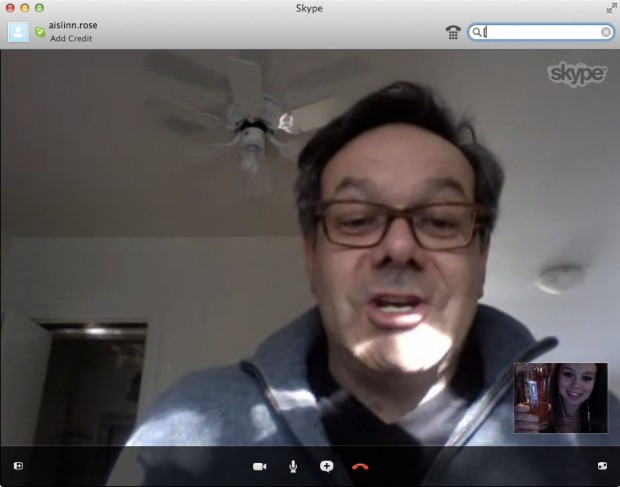
by Aislinn Rose
Last Friday I had the pleasure of interviewing Michael Healey, whose play Proud is currently onstage at The Berkeley Street Theatre.
On beer, small people, confessions, and plays I haven’t seen
AISLINN: Thanks for Skyping with me today. I’m actually interviewing you from my local, The Mugshot Tavern… my favourite little pub at Bloor & Keele, where I can walk in and the owner will say, “Aislinn, I have a great new beer on cask for you”.
MICHAEL: That’s the sweetest thing! I don’t have a local… I don’t get out of the house much.
AISLINN: Well, you do have 2 small people…
MICHAEL: That’s right… who insist I stay at home. Oh, I’m so envious right now!
[He has spied me sipping my pint.]
AISLINN: Let’s talk about your play. I have a confession to make… another one.
MICHAEL: [Laughs] It’s just all confessions with you…
AISLINN: That’s the old Catholic in me… all the guilt and none of the faith.
So… Proud is the first Michael Healey play I’ve ever seen. Partly due to the fact I lived in Australia for four years…
Can you give me a bit of a backdrop for the trilogy? [Courageous, Generous, and now Proud]
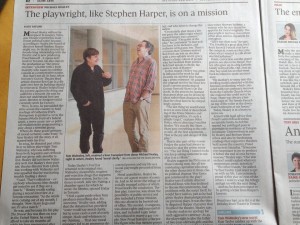
Tom Walmsley & Michael Healey in the G&M Print edition
MICHAEL: The idea for the trilogy started 8 years ago when I gave Tom Walmsley part of my liver. I’d say prior to that my plays were interested either in form, or, in the case of The Drawer Boy I was trying to learn how to write a two act comedy structure. Or in the minutia of my own psychology. The couple of plays after the Drawer Boy were about the interesting corners of my own feelings and experiences, and that event [the liver donation] kind of turned my gaze outward.
This play is about what it is we want from our political institutions.
AISLINN: So what do YOU want from our political institutions?
MICHAEL: I guess I want to be offered ideas that I haven’t already heard, and I want to be inspired by those ideas. I want somebody to articulate a notion of our society and our country that’s larger than the one that I currently possess.
AISLINN: So your… in terms of the ideologies out there you’ve got the group of people who want the guy they can have a beer with… or the manager versus the leader. So you’re looking more for the leader than the guy who’s going to just manage the finances.
MICHAEL: I guess that’s right. The guy that I want is a pretty good manager too…
Fiscal Conservativism
AISLINN: Which leads me to some of the questions for you that came to me via Facebook. What is your response to the notion of someone being “fiscally conservative and socially progressive?
MICHAEL: Well… I don’t see any incompatibility with those two ideas living together. How it works out, it’s always the distance between your ideals and what’s possible. Politics is the art of the possible. The difference between what you aspire to and what you can manage is where the truth lies. So… if there is any contradiction between those two statements, the way that you work out those contradictions is the way… is the kind of politician that you become… if that’s coming from a politician.
If it’s coming from a citizen, then… I think everybody is capable of maintaining ideas that aren’t necessarily resolved.
AISLINN: But what do you think “fiscally conservative” means these days?
MICHAEL: Well the problem is that fiscally conservative these days means “good with other people’s money” and the fact is that progressives are completely capable of being good with other people’s money, but that right has managed to co-opt that notion and own it.
AISLINN: And if we look at the recent big spenders in government across North America, I just don’t understand why those notions still exist…
Is Michael Healey a Soothsayer?
AISLINN: So now I want to ask you about some of the things that happen in your play. But first I want to ask… are you a soothsayer?
MICHAEL: [Laughs] You know… none of things that things that have come up recently were that hard to guess about. You know… the thing about the abortion bill in the play, and the guy’s abortion bill… or quasi abortion bill that got defeated in the house… since the Conservatives have been in power, backbenchers have floated four or five different Private Members Bills on Abortion… controlling abortion.
The Abortion Bill I describe in the play is verbatim to the bill that was brought up in, I think, 2007 by some guy. So, I may look clever, but these things are not terribly far fetched. But the timing is awesome. It’s great to get the play on at the moment that the House is coming back to it and these things are coming back to boil again.
On merging the left
AISLINN: I’m curious about your thoughts on voter cooperation. There’s a line in your play that gets a good laugh about the merging of the progressive parties… so I’m curious about how you feel about this notion of some kind of cooperation between the progressive parties. Or… the non-conservative parties…
MICHAEL: I have to admit I haven’t thought about this as deeply as I think Wheeler has for example.
AISLINN: I don’t know why you would mention him in this moment. I joke.
MICHAEL: My basic feeling about it is that anything that streamlines discussion… debate… is in the long-term, bad for politics. As I say in the play… once they unified the right, maybe it became inevitable that eventually the left would unite.
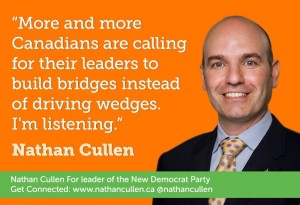
Cullen's NDP Leadership campaign
AISLINN: But what if we’re not talking about merging? Let’s talk Nathan Cullen’s plan – and to clarify for when I do the transcription – to look at those ridings where it looks like if the Liberals and NDP were to come together they could defeat a sitting Conservative, that you have run-off ballots in the lead-up to the election to determine whether it should be a Liberal or an NDP that should run in that riding for the election.
MICHAEL: Right…
AISLINN: To get to a point where you get the Conservatives out, and then we bring in voter reform where it’s no longer this first-past-the-post system, so we can go back to running whatever candidates we want, and we have some kind of ranked ballots, or the proportional representation that Ontario soundly voted down a few years ago because no one knew what that complicated ballot meant…
MICHAEL: … all these ideas that everybody floats when they’re not in power!
AISLINN: Right, yes… as you say in your play.
MICHAEL: … and then just rejects!
I don’t know. Isn’t that just a sad way to have to beat these people? Isn’t that a kind of collusion, doesn’t that limit… ultimately limit democracy? I mean, I understand what it means in practical terms… I understand… generation upon generation of Harper conservativism… until somebody spends 35 years, the way that he spent 35 years putting an idea together and building a coalition among the people in the country… until somebody spends the time doing that… don’t we just have to wait? Don’t we just necessarily diminish the concept of democracy every time the Liberals and the NDP collude in a riding. Don’t we?
[silence]
AISLINN: I’m a little depressed. Are you telling me that we have 35 more years of this to go?
MICHAEL: [Laughing] I think… well… I’ll go this far: they’ll win another majority in the next election. Beyond that I’m not going to say. So 2015, for sure. In my opinion. I just don’t see anybody… I just don’t see it… there is no short cut. And he knew that. He learned that, and he put in the time. And there is no short cut to creating a message that a wide swath of the middle of the country can get behind.
What are the requirements for running for office?
AISLINN: So I want to talk briefly about the female character in your play, Jisbella. She’s a former manager of a St. Hubert in Quebec. I’m curious to know what you think the qualifications of an MP should be.
MICHAEL: Well, I don’t think that there should be any beyond the ones that Elections Canada has… whatever they are. I don’t know what the qualifications are really. I mean, there are a lot of lawyers in Ottawa. It’s probably right that there are a lot of lawyers in Ottawa because it’s where they make laws.
I for one, love it when they get a Monte Solberg… is that who I’m thinking of? Who was the Reform MP who never took off his fucking cowboy hat?
AISLINN: Oh, I don’t know…
[I looked it up, it was Darrel Stinson.]
MICHAEL: I just think, you know, it’s democracy and it’s messy and stupid, and occasionally it coalesces and awesome things happen, but in the main it’s messy and stupid. I think that the people who stand for election should reflect the diversity of that messiness and stupidity.
AISLINN: Right… and then I guess from that pool, we hope the leader will arise. That leader who will inspire us and give us a bigger vision.
MICHAEL: That’s right. It’s a frustrating and inevitably organic process.
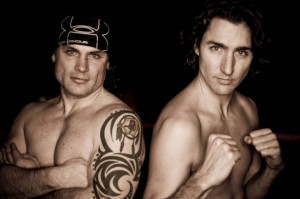
We're not saying good looks don't matter...
AISLINN: Okay! So then what do you think of the new Trudeaumania?
MICHAEL: Well yeah! He doesn’t have his father’s depth…
I’m not saying that the hair and the good looks don’t matter, and the fact that he’s charming doesn’t matter…
AISLINN: … and a good boxer!
MICHAEL: … sorry?
AISLINN: … and a good boxer.
MICHAEL: And a good boxer! I’m just saying that 10 minutes in a ring, so to speak, with Harper in one of these debates and we’re just going to see… you’ll just see.
My job that he always wanted, and why he was glad to see Aaron Sorkin go
AISLINN: When I wrote my piece about my own history with the Conservative party here in Ontario, you said something about… you’re shaking your head…?
MICHAEL: I find it instantly intimidating to speak to you… you remind me of that… because, I mean, I’m talking about things that you have a kind of legitimacy about that I will never have.
AISLINN: Were you a fan of the West Wing? You do seem to speak with some legitimacy. I mean, yes, I’ve seen some of this stuff, but it does ring quite true to me…
MICHAEL: Well, I’m probably the only person in the world who preferred the West Wing after they kicked off Aaron Sorkin, and they hired a bunch of former White House flacks to come in and write… because the stories instantly became more true to politics in that country.
AISLINN: You said something on Facebook about me having the job you always wanted… surely that’s not true.
MICHAEL: It is… when I was 12 years old I explored the possibility of becoming a page at the Ontario Legislature… I was one of those kids, and then it never came to fruition.
In some ways, that world does fascinate me… I think the same things that fascinate me in the theatre are the same things that fascinate me in that world… the distance between aspiration and reality, and the drama and comedy that are available inside that gap.
The thing I don’t have patience for is consensus building… the art of the possible. I think I’d get very frustrated very quickly with the glacial pace of a legislative agenda.
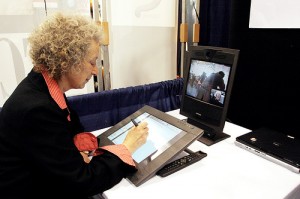
Atwood signing remotely via "longpen"
AISLINN: Did you know about the autopen, did you know there was such a thing?
MICHAEL: I guess I was. I assumed these people don’t sign their own letters anymore. Isn’t Margaret Atwood’s thing just a long-distance version?
AISLINN: But Margaret Atwood… she’s still signing from long-distance. She’s still doing the arm movements across the world to do the signing. The autopen is someone like me sitting in a room with a big stack of letters, and a big wonky wheel that turns around and makes the pen move to look like the signature.
But every now and then I’d be working on a letter saying “we’re sorry we have to cut down the tree on your lawn”, and every now and then I was able to save a tree and say, “no, I don’t like this answer…”
MICHAEL: Would you really do that?
AISLINN: Oh yeah, if I got a letter where I’d see we were giving the standard response to what didn’t seem like a standard situation, I’d pull it and talk to the appropriate person in the ministry to see if we could get a different result for that person.
MICHAEL: So really, in a lot of ways, power resided with you.
AISLINN: Oh yeah, totally…
[Laughter]
MICHAEL: I’m kidding, but it’s also true…in the same way that, you know, that your leg works because of its joints… you were right there in that moment, you were the only person with an engaged brain in that moment between constituent and elected official.
AISLINN: I think, for me, that was part of my survival in that job and feeling awful about being there. But if I could walk away at the end of the day where I’d fixed something for someone… I could feel okay about.
Off topic and onto Factory Theatre…
AISLINN: So I do have one final question for you. It’s off topic.
For me, I intend to continue supporting Factory Theatre, and the new mission of Nina & Nigel as they work on the creation of their new season.
I wonder what you would like to say to someone like me who intends to continue with that support.
MICHAEL: I think you absolutely should. I think that the reason I’m so categorical about my reaction to Ken’s firing was because I was around… I wasn’t around in 1977 when he started the theatre, I was around in 1996 when he saved it. I was actually part of the community when that happened. So I saw him… the padlocks were literally on the door, he went in, he put his own money into the place, and then he took no salary for almost a year, and they went from there in 1996, to a place where they owned that $10 million piece of property.
And I think, for that, because I experienced that, my position “you cannot fire that guy that way”, and all of the actions I took that flowed from that position, which is to say writing the boycott letter… my reaction and my response to this is personal, as is yours, and is therefore legitimate.
That’s really all I can say.
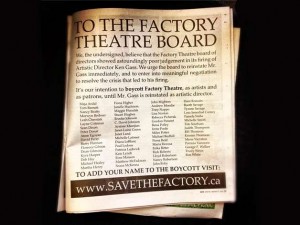
The Boycott's full page ad in NOW
Was I hurt and disappointed that every play wasn’t pulled from the season immediately? Yes. Was I hurt and disappointed when there wasn’t a universal outcry and condemnation of the board among theatre artists in this city? I was hurt and surprised in the same way I was hurt and surprised by the Tarragon’s behaviour, in much the same way.
I suddenly felt like I had been making assumptions about something, and that the reality was wildly different from those assumptions.
I think your position is absolutely legitimate. I’m sorry about the way that this has all broken down, I think there are less reasonable people on my side that think the way I do, and less reasonable people on your side as well, and that thanks to them, there is a kind of bizarre rift in our community at the moment.
AISLINN: Well, the challenging thing for me is that I don’t feel like I’m on a particular side. I find the situation to be incredibly complex and probably more complex than the “official sides” are allowing it to be, and so, I feel like I can be “for” Ken, and I can also be “for” Factory Theatre, and all of the people that are still there, and who were incredibly hurt by the notion of The Factory falling apart without Ken, when they had previously felt that they were also important pillars of that organization.
MICHAEL: They absolutely are important pillars of that theatre. I don’t blame anybody for any of the feelings that they had.
My over-simple analysis… and I own the fact it is over-simple, is you can’t fire that guy that way. And all the decisions I’ve made and taken since that moment were based on that. I honestly thought the boycott would be a universal boycott, and that within a matter of weeks Ken would be reinstated, a negotiation about how his exit would be handled would be underway, and that the season would be restored and that nobody would have to lose a job. I lost a job, I was supposed to be in George Walker’s show.
And I’m here to tell you that I’m surprised.
If you want to catch Proud before it closes October 6th, you should get your tickets soon as performances are selling out. Everything you need to know can be found on the Proud website here, or on the box office website here.
Follow Aislinn on Twitter: @AislinnTO
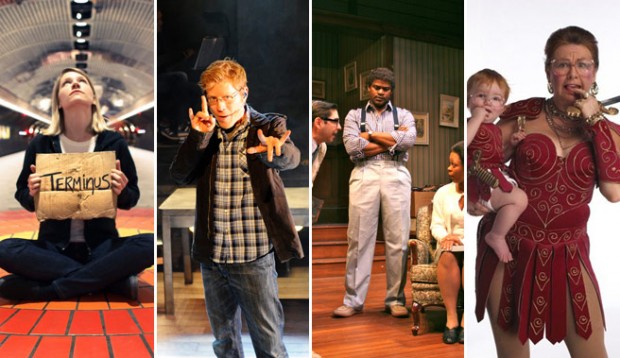
Images from the Mirvish 'Second Stage' Season
by Michael Wheeler
Last week David Mirvish, the pre-eminent producer of for-profit Toronto theatre made two major announcements that reflect the rapidly transforming theatrical ecosystem to one driven by indie artists.
On Monday Sept 24, Mirvish announced the launch of a “Second Stage” season that will feature four productions of contemporary drama that are less mainstream than its general offerings. These shows are being offered as a package where four tickets can be purchased for $100-$200 depending on seating.
Two of these productions are Toronto indie theatre hits: Studio 180’s Clybourne Park produced originally in association with Canadian Stage last year, and Outside The March’s Terminus, one of the standout hits of the SummerWorks Festival two months ago.
The other two shows in The Second Stage Season also have indie roots: CBC’s Mary Walsh‘s Dancing With Rage was originally going to be a Theatre Passe Muraille production before it was cancelled due to illness, while Anthony Rapp’s (brother of playwright Adam Rapp) autobiographical one-man show Without You got its profile as a darling of the Edinburgh Fringe.
This seems an incredibly positive development for Toronto’s theatrical ecosystem by creating a plausible process whereby artist-driven, independent work created in the not-for-profit sector that demonstrates box office success can become a commercial hit.

Frank Gehry's proposed model for the King St Mirvish re-development.
Equally big news was Mirvish’s weekend announcement of plans to to tear down the 2,500 seat Princess of Wales theatre and replace it with a modern art gallery, a new campus for OCAD, retail space, and three condo towers – all designed by Frank Gehry who recently revamped the Art Gallery of Ontario. Click for photos of the buildings that will have to go to make it happen.
Anticipating a backlash to this news, Mirvish wrote a personal letter to the media in lieu of the regular press release outlining his reasoning and the Mirvish legacy in the neighbourhood. Reaction to this announcement was much less generous than the response to the indie theatre season, leading many commentators to question the necessity of tearing down one of the crown jewels of Toronto performing arts.
Some thoughts to consider before critiquing this decision too harshly:
Big theatres in Toronto are in big trouble:
One needs look no further that The City of Toronto’s Task Force studying what to do with the three municipally owned large-venue theatres: The Sony Centre, The St Lawrence Centre and The Toronto Centre for The Performing Arts, to see that no one really has a clue how to fill these massive venues on a regular basis. Mega-musicals with massive overhead and serious box office started to stop making sense around when Phantom and the original Ragtime left town.
The era of theatre as driven by expensive spectacle is waning. Or at least, Toronto cannot support too many of theses types of productions at one time and some of them now occur in tents on the waterfront and/or involve horses.
There is money in real estate not theatre

Regent Park mixed income redevelopment
Given the general benefits Mirvish provides the ecosystem – not just the Second Stage Season, but also a partnership with The Toronto Fringe and creator of a new home for Theatre Museum Canada, I’m reticent to go apeshit about the fact they will also transform their properties to create revenue.
Theatre is a sucker’s game if you’re looking to make a buck. How fast did Aubrey Dan burn through $50 Million? Better Mirvish Inc. makes money somewhere else so it can continue to be a healthy and thriving contributor to the theatre community.
Population density is good for downtown Toronto
It has become quite fashionable to critique condo development as garish cash grabs. Practically speaking, population density is something from which Toronto could benefit more from through social and environmental perspectives. In terms of transportation issues, this density is best added near existing subway stops, which the Mirvish development is.
I’m not arguing for sainthood for building condos, but I don’t think it’s the worst thing in the world right if done right. I would love to see some income geared housing in there to ensure these places don’t become homogenous palaces for the superrich… Hey – you never know!
There’s an opportunity here:
David Mirvish stated a willingness to build a new theatre if necessary as stated in his letter to the media. Frustration at the loss of The Princess of Wales would probably be better channelled lobbying for something 500 seat-ish that meets the demands of contemporary theatre and audiences to be included in the development.
With TIFF for film, Roy Thompson Hall for music, and a new modern Art Gallery on the strip, King West would be a perfect location for a Gehry-designed permanent home for the newly announced Mirvish/Indie Theatre season.
Follow Michael on Twitter: @michaelcwheeler












Recent Comments